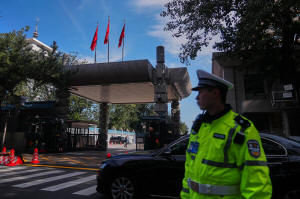China's economy slows to 4.8% annual growth in July-September, hit by
tariffs and slack demand
[October 20, 2025] By
CHAN HO-HIM
HONG KONG (AP) — China's economy expanded at the slowest annual pace in
a year in July-September, growing 4.8%, weighed down by trade tensions
with the United States and slack domestic demand.
The July-September data was the weakest pace of growth since the third
quarter of 2024, and compares with a 5.2% pace of growth in the previous
quarter, the government said in a report Monday.
In January-September, the world’s second largest economy grew at a 5.2%
annual pace. Despite U.S. President Donald Trump’s higher tariffs on
imports from China, its exports have remained relatively strong as
companies expanded sales to other world markets.
China’s exports to the United States fell 27% in September from the year
before, even though growth in its global exports hit a six-month high,
climbing 8.3%.
Exports of electric vehicles doubled in September from a year earlier,
while domestic passenger car sales climbed 11.2% year-on-year in last
month, down from a 15% rise in August, according to data released last
week.
Tensions between Beijing and Washington remain elevated, and it's
unclear if Trump and Chinese leader Xi Jinping will go ahead with a
proposed meeting during a regional summit at the end of this month.
Xi and other ruling Communist Party members are convening one of China's
most important political meetings for the year on Monday, where they
will map out economic and social policy goals for the country for the
next five years.
The economy slowed in the last quarter as the authorities moved to curb
fierce price wars in sectors such as the auto industry due to excess
capacity.
China is also facing challenges including a prolonged property sector
downturn which has been affecting consumption and demand.

Data released Monday showed China's residential property sales fell 7.6%
by value in the January-September period from a year earlier. Industrial
output rose 6.5% year-on-year last month, the fastest pace since June,
but retail sales growth slowed to 3% from the year before.
Ratings agency S&P estimates nationwide new home sales will fall by 8%
in 2025 from the year before and by 6% to 7% in 2026.
The World Bank expects China’s economy to grow at a 4.8% annual rate
this year. The government's official growth target is around 5%.
[to top of second column] |

Chinese security personnel stand guard at the entrance to the Jingxi
Hotel where the Communist Party's Central Committee is holding its
fourth plenum, in Beijing, Monday, Oct. 20, 2025. (AP Photo/Andy
Wong)
 Chinese shares rose Monday, with the
Hang Seng in Hong Kong climbing 2.3% and the Shanghai Composite
index up 0.5%.
A National Bureau of Statistics spokesman said China has a “solid
foundation” to achieve its full-year growth target, but cited
external complications — including trade friction with the U.S. and
other trading partners and protectionist policies in many countries
— as reasons for the slowdown.
China’s stronger economic growth in the first half of this year
gives it “some buffer” to achieve the growth target, said Lynn Song,
chief economist for Greater China at ING Bank.
However, spending during China’s eight-day Golden Week national
holiday in October was “mildly disappointing,” reflecting sluggish
consumer confidence and demand, Morningstar analysts said in a note
this month.
Investments in factories, equipment and other “fixed assets” fell
0.5% in the last quarter, underscoring weakness in domestic demand.
It also was reflected in prices, which have continued to fall both
at the consumer and the wholesale level.
There's room for the government to do more, Song said.
“(We) are looking to see if there will be further measures to
support consumption and the property market, as the impact from
previous policies begins to weaken,” Song said.
Economists are also expecting a rate cut by China’s central bank by
the end of the year, which could encourage more spending and
investment.
China's economy is also likely to further slow in 2026, said
Jacqueline Rong, chief China economist at BNP Paribas, as property
investment in the country “looks (to) continue falling" and the AI
boom, which helped lift China's economy and fueled a stock market
rally, is expected to moderate.
All contents © copyright 2025 Associated Press. All rights reserved |